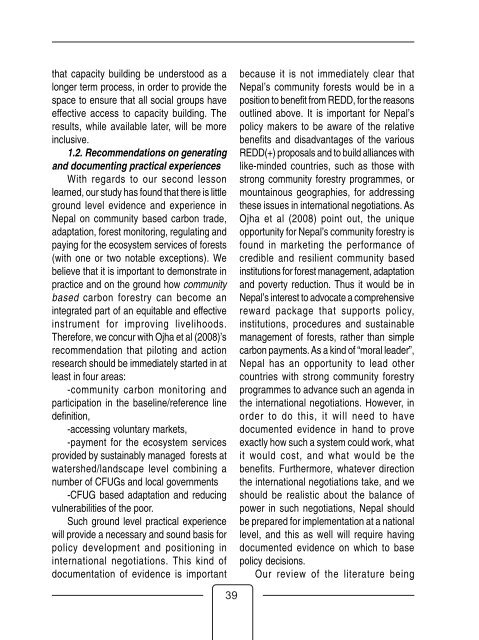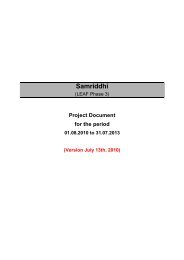Climate Change Mitigation and Adaptation
Climate Change Mitigation and Adaptation
Climate Change Mitigation and Adaptation
Create successful ePaper yourself
Turn your PDF publications into a flip-book with our unique Google optimized e-Paper software.
that capacity building be understood as a<br />
longer term process, in order to provide the<br />
space to ensure that all social groups have<br />
effective access to capacity building. The<br />
results, while available later, will be more<br />
inclusive.<br />
1.2. Recommendations on generating<br />
<strong>and</strong> documenting practical experiences<br />
With regards to our second lesson<br />
learned, our study has found that there is little<br />
ground level evidence <strong>and</strong> experience in<br />
Nepal on community based carbon trade,<br />
adaptation, forest monitoring, regulating <strong>and</strong><br />
paying for the ecosystem services of forests<br />
(with one or two notable exceptions). We<br />
believe that it is important to demonstrate in<br />
practice <strong>and</strong> on the ground how community<br />
based carbon forestry can become an<br />
integrated part of an equitable <strong>and</strong> effective<br />
instrument for improving livelihoods.<br />
Therefore, we concur with Ojha et al (2008)’s<br />
recommendation that piloting <strong>and</strong> action<br />
research should be immediately started in at<br />
least in four areas:<br />
-community carbon monitoring <strong>and</strong><br />
participation in the baseline/reference line<br />
definition,<br />
-accessing voluntary markets,<br />
-payment for the ecosystem services<br />
provided by sustainably managed forests at<br />
watershed/l<strong>and</strong>scape level combining a<br />
number of CFUGs <strong>and</strong> local governments<br />
-CFUG based adaptation <strong>and</strong> reducing<br />
vulnerabilities of the poor.<br />
Such ground level practical experience<br />
will provide a necessary <strong>and</strong> sound basis for<br />
policy development <strong>and</strong> positioning in<br />
international negotiations. This kind of<br />
documentation of evidence is important<br />
because it is not immediately clear that<br />
Nepal’s community forests would be in a<br />
position to benefit from REDD, for the reasons<br />
outlined above. It is important for Nepal’s<br />
policy makers to be aware of the relative<br />
benefits <strong>and</strong> disadvantages of the various<br />
REDD(+) proposals <strong>and</strong> to build alliances with<br />
like-minded countries, such as those with<br />
strong community forestry programmes, or<br />
mountainous geographies, for addressing<br />
these issues in international negotiations. As<br />
Ojha et al (2008) point out, the unique<br />
opportunity for Nepal’s community forestry is<br />
found in marketing the performance of<br />
credible <strong>and</strong> resilient community based<br />
institutions for forest management, adaptation<br />
<strong>and</strong> poverty reduction. Thus it would be in<br />
Nepal’s interest to advocate a comprehensive<br />
reward package that supports policy,<br />
institutions, procedures <strong>and</strong> sustainable<br />
management of forests, rather than simple<br />
carbon payments. As a kind of “moral leader”,<br />
Nepal has an opportunity to lead other<br />
countries with strong community forestry<br />
programmes to advance such an agenda in<br />
the international negotiations. However, in<br />
order to do this, it will need to have<br />
documented evidence in h<strong>and</strong> to prove<br />
exactly how such a system could work, what<br />
it would cost, <strong>and</strong> what would be the<br />
benefits. Furthermore, whatever direction<br />
the international negotiations take, <strong>and</strong> we<br />
should be realistic about the balance of<br />
power in such negotiations, Nepal should<br />
be prepared for implementation at a national<br />
level, <strong>and</strong> this as well will require having<br />
documented evidence on which to base<br />
policy decisions.<br />
Our review of the literature being<br />
39

















